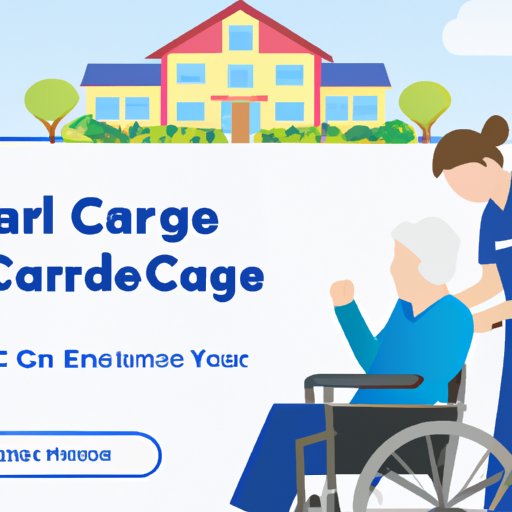Introduction
Assisted living is a type of housing designed for seniors who need help with daily activities, such as bathing, dressing, eating, and taking medications. The goal of assisted living is to provide a safe environment where seniors can maintain their independence while receiving help with the tasks of daily life. But does Medicare cover assisted living?
The answer is both yes and no. Medicare will pay for certain types of services provided in an assisted living facility, but it does not cover the cost of room and board. In this article, we’ll explore what Medicare does and does not cover in assisted living facilities, as well as other financial assistance options that may be available.

Explaining What Medicare Does and Does Not Cover in Assisted Living Facilities
Medicare is a federal health insurance program that provides coverage for people over 65 and some younger people with disabilities. It covers a variety of medical services, including hospital stays, doctor visits, preventive care, and prescription drugs. But it does not cover long-term care, such as the cost of living in an assisted living facility.
However, if a person needs skilled nursing or rehabilitative services, Medicare may cover some of the cost. It is important to note that Medicare only pays for services provided by a Medicare-certified provider, which means that the facility must be approved by Medicare in order for the services to be covered.
It is also important to understand that Medicare does not cover personal care services, such as assistance with bathing, dressing, and eating. These services are generally provided by the staff at the assisted living facility and are not covered by Medicare.
“Medicare does not cover most of the services offered in assisted living communities,” says Dr. David Katz, director of the Yale University Prevention Research Center. “However, it may cover some of the medical services and treatments provided by a certified provider in the facility.”
A Breakdown of the Types of Care Covered by Medicare in Assisted Living Facilities
The types of care covered by Medicare in assisted living facilities include:
Skilled Nursing Care
Medicare will cover the cost of skilled nursing care provided by a Medicare-certified provider in an assisted living facility. This includes services such as wound care, injections, and IV therapy. Medicare will also cover the cost of physical, occupational, and speech therapy if it is ordered by a doctor.
Rehabilitation Services
Medicare may cover the cost of rehabilitation services provided by a Medicare-certified provider in an assisted living facility. This includes physical, occupational, and speech therapy provided under the supervision of a doctor.
Personal Care Services
Medicare does not cover the cost of personal care services provided by the staff of an assisted living facility. These services include help with bathing, dressing, eating, and other activities of daily living.

An Overview of Financial Assistance Available to People Who Need Assisted Living Care
In addition to Medicare, there are several other sources of financial assistance available for people who need help paying for assisted living. These include:
Medicaid Waiver Programs
Many states offer Medicaid waiver programs that can help cover the cost of assisted living. These programs allow individuals to stay in their homes or receive care in an assisted living facility instead of going into a nursing home. Each state has its own rules and eligibility requirements, so it is important to check with your local Medicaid office to see what options are available.
Long-Term Care Insurance
Long-term care insurance is another option for covering the cost of assisted living. These policies typically pay a set amount per day or month to help cover the cost of care in an assisted living facility. Some policies may also cover home care, adult day care, and respite care.
Veterans Benefits
Veterans and their spouses may be eligible for special benefits that can help cover the cost of assisted living. These benefits include pensions, disability payments, and health care services. To find out more about these benefits, contact your local Veterans Affairs office.

How to Figure Out If Your Medical Condition Qualifies You for Medicare Coverage in an Assisted Living Facility
If you think you may qualify for Medicare coverage in an assisted living facility, it is important to understand the eligibility requirements. To be eligible for Medicare coverage, you must meet the following criteria:
- You must be 65 years of age or older.
- You must be a U.S. citizen or legal permanent resident.
- You must have a qualifying medical condition, such as a chronic illness or disability.
- You must be able to demonstrate a need for skilled nursing or rehabilitation services.
In addition, you must provide documentation from your doctor or other health care provider that supports your need for care in an assisted living facility. This may include medical records, lab results, and other documents.
Comparing the Costs of Assisted Living with Other Long-Term Care Options
When considering long-term care options, it is important to compare the costs of each option to determine which one is right for you. Here are some common long-term care options and their associated costs:
In-Home Care
In-home care is a popular option for seniors who want to remain in their own homes. The cost of in-home care varies depending on the services needed and the number of hours of care required. On average, in-home care costs $20-$30 per hour.
Nursing Home Care
Nursing home care is usually more expensive than in-home care or assisted living. The average cost of nursing home care is $200-$300 per day, or $6,000-$9,000 per month.
Exploring Different Ways to Pay for Assisted Living without Medicare Coverage
If you don’t qualify for Medicare coverage in an assisted living facility, there are still other ways to pay for care. These include:
Private Health Insurance
Some private health insurance plans may cover the cost of assisted living. Check with your insurance provider to see if your plan covers any of the services offered in an assisted living facility.
Reverse Mortgages
Reverse mortgages are loans that allow homeowners to access the equity in their homes. The loan proceeds can be used to cover the cost of assisted living. There are certain eligibility requirements and fees associated with reverse mortgages, so it is important to do your research before applying.
Life Settlements
A life settlement is a financial transaction in which a life insurance policy is sold to a third party for a lump sum of money. The proceeds from the sale can be used to cover the cost of assisted living. However, life settlements are complex transactions and should only be considered after consulting with a financial advisor.
Conclusion
Although Medicare will not cover the cost of room and board in an assisted living facility, it may cover some of the medical services and treatments provided by a Medicare-certified provider. There are also other sources of financial assistance available, such as Medicaid waiver programs, long-term care insurance, and veterans benefits. It is important to do your research and explore all of your options before making a decision.
For more information about Medicare coverage in assisted living facilities, visit the Centers for Medicare & Medicaid Services website. You can also speak to an experienced elder law attorney or a financial advisor to get more information about the different types of financial assistance available.
(Note: Is this article not meeting your expectations? Do you have knowledge or insights to share? Unlock new opportunities and expand your reach by joining our authors team. Click Registration to join us and share your expertise with our readers.)
